ADD AND SUBTRACT RATIONAL NUMBERS
Subscribe to our ▶️ YouTube channel 🔴 for the latest videos, updates, and tips.
Addition
Adding Rational Numbers with Same Denominator :
To add two or more rational numbers with same denominator, we have to take the denominator once in common and add the numerators.
Example :
Simplify : 1/5 + 2/5.
1/5 + 2/5 = (1 + 2) / 5
1/5 + 2/5 = 3/5
Adding Rational Numbers with Different Denominators :
To add two or more rational numbers with different denominators, we have to follow the steps given below.
Step 1 :
Find the least common multiple of the denominators.
Step 2 :
Make the denominators same using least common multiple and multiplication.
Step 3 :
Take the denominator once in common and add the numerators.
Example :
Simplify : 1/4 + 1/6.
Least common multiple of (4, 6) = 12
Multiply the numerator and denominator of the first rational number by 3 to get the denominator 12.
Multiply the numerator and denominator of the second rational number by 2 to get the denominator 12.
1/4 + 1/6 = (1x3) / (4x3) + (1x2) / (6x2)
1/4 + 1/6 = 3/12 + 2/12
1/4 + 1/6 = (3 + 2) / 12
1/4 + 1/6 = 5/12
Subtraction
Subtracting Rational Numbers with Same Denominator :
To subtract two rational numbers with same denominator, we have to take the denominator once in common and subtract the numerators.
Example :
Simplify : 2/5 - 1/5.
2/5 - 1/5 = (2 - 1) / 5
2/5 - 1/5 = 1/5
Subtracting Rational Numbers with Different Denominators :
To subtract two rational numbers with different denominators, we have to follow the steps given below.
Step 1 :
Find the least common multiple of the denominators.
Step 2 :
Make the denominators same using least common multiple and multiplication.
Step 3 :
Take the denominator once in common and subtract the numerators.
Example :
Simplify : 1/6 - 1/8.
Least common multiple of (6, 8) = 24
Multiply the numerator and denominator of the first rational number by 4 to get the denominator 24.
Multiply the numerator and denominator of the second rational number by 3 to get the denominator 24.
1/6 - 1/8 = (1x4) / (6x4) + (1x3) / (8x3)
1/6 - 1/8 = 4/24 - 3/24
1/6 - 1/8 = (4 - 3) / 24
1/6 - 1/8 = 1/24
Practice Questions
Question 1 :
Simplify the following and write your answer as a proper fraction or as a whole or mixed number.
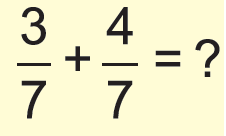
Answer :
Since the denominators are same, we can put only one common denominator and combine the numerators.
= (3 + 4)/7
= 7/7
= 1
Question 2 :
Simplify the following and write your answer as a proper fraction or as a whole or mixed number.

Answer :
Since the denominators are same, we can put only one common denominator and combine the numerators.
= (12 - 4)/13
= 8/13
Question 3 :
Simplify the following and write your answer as a proper fraction or as a whole or mixed number.
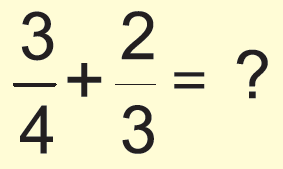
Answer :
Since the denominators are not same, we need to take L.C.M in order to convert the denominators same.
L.C.M (4, 3) = 12
= (3/4) x (3/3) + (2/3) x (4/4)
= (9/12) + (8/12)
= (9 + 8)/12
= 17/12
The numerator is grater than the denominator, we have to convert it into mixed fraction.
= 1 5/12
Question 4 :
Simplify the following and write your answer as a proper fraction or as a whole or mixed number.
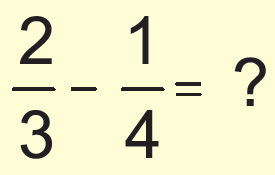
Answer :
Since the denominators are not same, we need to take L.C.M in order to convert the denominators same.
L.C.M (3, 4) = 12
= (2/3) x (4/4) - (1/4) x (3/3)
= (8/12) - (3/12)
= (8 - 3)/12
= 5/12
Question 5 :
Simplify the following and write your answer as a proper fraction or as a whole or mixed number.
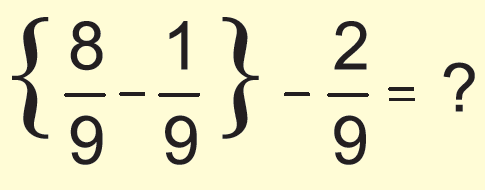
Answer :
Now we need to consider the given question as two parts.
First we have to simplify the fractions inside the parenthesis.
Subtract 2/9 from the simplified answer.
= {(8/9) - (1/9)} - (2/9)
= (8- 1)/9 - (2/9)
= (7/9) - (2/9)
= (7 - 2)/9
= 5/9
Question 6 :
Simplify the following and write your answer as a proper fraction or as a whole or mixed number.
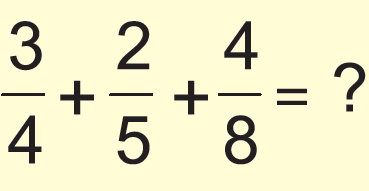
Answer :
Since the denominators are not same, we have to L.C.M in order to convert the denominators same.
L.C.M (4, 5, 8) = 40
= (3/4) x (10/10) + (2/5) x (8/8) + (4/8) x (5/5)
= (30 + 16 + 20)/40
= 66/20
= 33/10
Since the numerator is greater than the denominator, we have to convert into mixed fraction.
= 3 3/10.
Subscribe to our ▶️ YouTube channel 🔴 for the latest videos, updates, and tips.
Kindly mail your feedback to v4formath@gmail.com
We always appreciate your feedback.
About Us | Contact Us | Privacy Policy
©All rights reserved. onlinemath4all.com

Recent Articles
-
Digital SAT Math Problems and Solutions (Part - 29)
Mar 01, 26 07:26 PM
Digital SAT Math Problems and Solutions (Part - 29) -
Digital SAT Math Problems and Solutions (Part - 28)
Mar 01, 26 06:25 PM
Digital SAT Math Problems and Solutions (Part - 28) -
Digital SAT Math Problems and Solutions (Part -27)
Feb 28, 26 07:46 PM
Digital SAT Math Problems and Solutions (Part -27)


